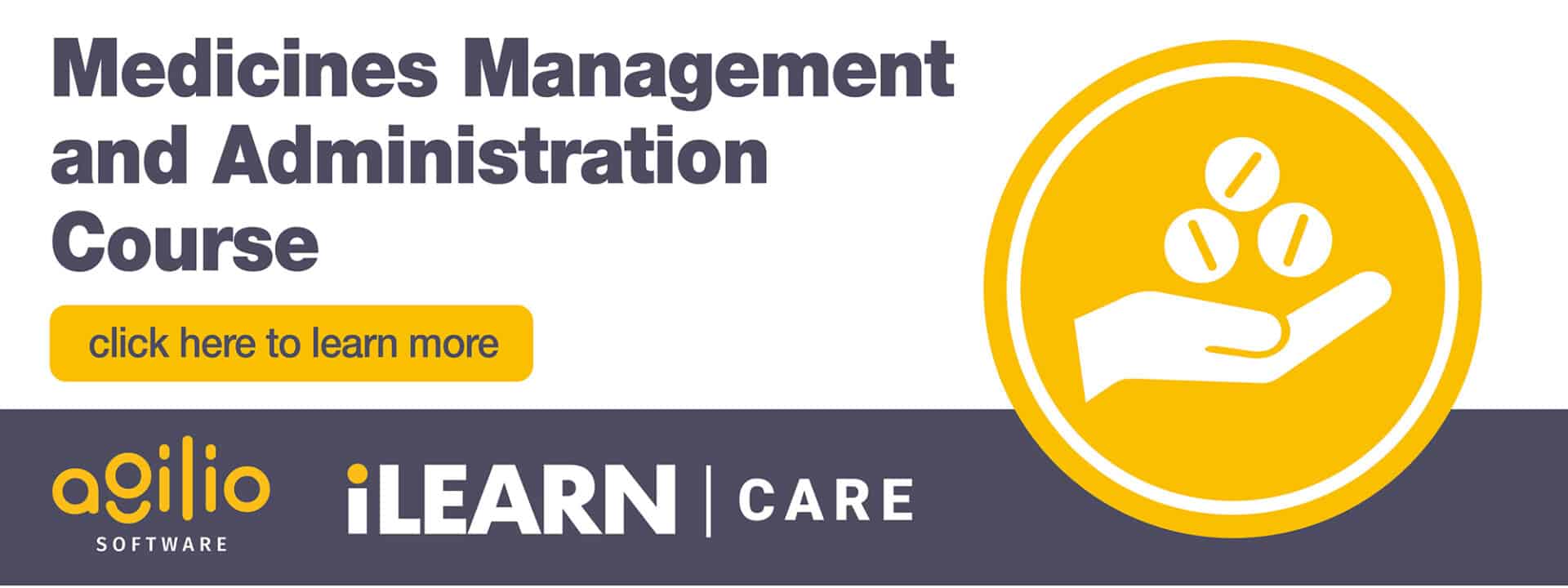Written by Dr Gerry Morrow, Medical Director at Agilio Software, and Ross Ferguson, our Deputy Editor and Lead Pharmacist at Agilio Software. Dr Gerry has over 20 years of experience working as a GP in the primary care sector, and has worked alongside NICE, Royal Colleges, Academic Health Science Networks and senior NHS bodies. Ross Ferguson has 30 years of experience within the pharmaceutical industry, and has been authoring content for over 25 years for the healthcare sector, and produces Clinical Knowledge Summaries for NICE, as well as authoring over 100 courses for Agilio’s e-learning platform, iLearn.

Why is medicine management important for care homes?
Medicines are the most common therapeutic intervention in the NHS and are an integral part of the daily routine in care homes as most residents are prescribed a range of medicines for both chronic and acute conditions.
Medication errors
Medication errors are responsible for 12,000 deaths every year and cost the NHS up to £1.5bn annually. They are also responsible for 6% of hospital admissions and prolong hospital stays by up to 14 days. One study estimated that care homes have the highest number of medication errors, at 42%.
Care home residents are often at higher risk as they are more likely to suffer major harm from a medication error. Residents tend to be older, with functional or cognitive impairment, and take multiple medications. In addition, residents frequently transfer across other care settings and care homes. There are also many drug interactions between medications that carers may be unaware of, resulting in significantly increased risk of medication error.
People with cognitive impairment are more likely to be exposed to medication errors. For example, people with dementia are less likely to receive as required medication appropriately. Issues with reaching for prescribed medications where non-pharmacological interventions may be safer and more appropriate have also been highlighted. For example, where antipsychotic medications have been prescribed to people with dementia to deal with behaviour which challenges, rather than addressing unmet needs with a calm non-confrontational approach and situational management.

NICE and CQC guidance managing medicines in care homes
Understanding these approaches are essential for the modern, compassionate care home. The regulatory oversight of care and nursing homes by the Care Quality Commission and advice by the National Institute for Health and Care Excellence are also aligned in this regard. Both organisations recommend that care providers “should ensure that a robust process is in place for identifying, reporting, reviewing and learning from medicines errors involving residents.” The CQC goes further and provides an outline of the use of Medicines care plans which should provide a resource which outlines the need for each medication, detail condition-specific medicines and a timetable for regular review.
Managing medicines in care homes
Medicines management is a complex system of processes and procedures to ensure that right person gets the right drug at the right time at the right dose by the right route.
All staff who are involved in administering medication should have relevant training to the scope of their role and this training should be refreshed and updated regularly. This means that your care staff will be involved in learning about ordering, receiving, storing, administering, and disposing of medicines, as well as keeping the necessary records.
Medication management training, a no-blame culture, rapid reporting, recording, and learning all contribute to a reduction in patient safety incidents and a safer environment for patients and staff.
Medicine management training for care homes
Enrolling your care staff on an appropriate training course will ensure that they are aware of NICE guidelines, reduce the risk of medication errors, and help you comply with CQC requirements.
The Agilio iLearn Care course Medicines Management and Administration complements face-to-face medication training and will equip your staff with the necessary information to ensure effective and efficient medicine management.
This course covers the following:
- Relevant legislation.
- How to order, receive, store, and dispose of medicines.
- The rules and processes for self-medicating residents.
- Information about common medications.
- How to administer a range of dosage formats.
- How to manage administration errors.
- Care staff responsibilities.
- Your organisation’s responsibilities.


